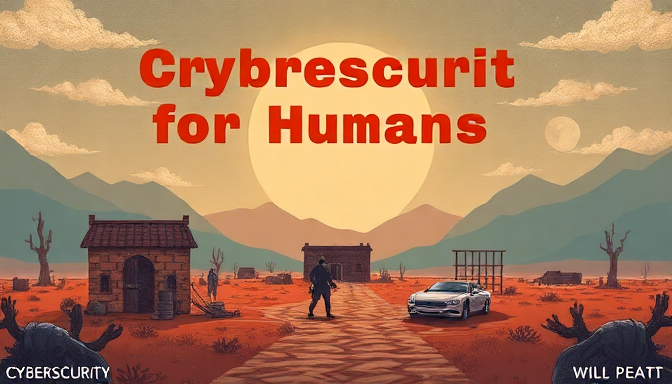
Why Are We Even Having This Conversation?
So, you picked up this book. Or maybe someone shoved it at you and said, "Read this, please." Either way, here we are, about to discuss things that, frankly, should be as intuitive as not licking a public doorknob. The fact that a book like this even needs to exist in the 21st century is, quite honestly, a bit depressing. It implies a fundamental disconnect between our digital lives and the common sense we *supposedly* apply everywhere else.
We're surrounded by technology, practically fused to our phones, yet a significant chunk of the population still seems baffled by concepts like "phishing email" or "strong password." It's like we've collectively decided that the rules of caution and skepticism only apply offline. This isn't rocket science; it's just basic self-preservation in a new environment. And yet, here I am, writing this, because apparently, the digital environment requires an explicit instruction manual for not being a complete digital doormat.
A Brief, Painful History of Humans Getting Pwned
Ah, a history lesson! Don't worry, it won't be boring like actual history. We're talking about the glorious, embarrassing saga of humans repeatedly dropping the digital ball. Getting "pwned" isn't some recent phenomenon; it's a time-honored tradition, practically etched into the digital stone tablets from the moment we first connected two computers. It seems our inherent ability to trust random things online has always been... robust.
From the innocent days of accidentally downloading viruses disguised as screensavers to the slightly less innocent era of clicking every pop-up promising free puppies or untold riches, we've been remarkably consistent in our digital missteps. Remember the panic of the late '90s and early 2000s? That was largely fueled by people opening attachments from strangers and wondering why their computer suddenly started playing annoying music and deleting files. Good times.
Fast forward a bit, and the methods evolved, but the core human element remained the weakest link. Phishing emails got craftier, malware got sneakier, but our willingness to believe that a long-lost relative in Nigeria desperately needs our bank details? Unwavering. This history isn't just for laughs (though it is); it's a pattern book, showing us the tried-and-true ways our brains get bypassed online. And yes, you've probably fallen for at least one of them.
Your Data: More Valuable Than You Think (To Someone Else)
You probably think your online life is utterly fascinating, but maybe not valuable to anyone else, right? Wrong. Every click, every search, every 'like' leaves a trail of data, and that trail is currency. While you might not see the value in your digital exhaust, others absolutely do.
Who are these data prospectors? They range from mundane advertisers wanting to shove relevant products in your face, to shadowy data brokers compiling profiles on everyone, right up to outright cybercriminals. These folks aren't just curious; they're using your information for everything from personalized spam to full-blown identity theft. Your digital footprint is their treasure map, leading straight to potential opportunities for exploitation.
Handing over your data carelessly is like scattering puzzle pieces of your life across the internet, waiting for someone malicious to assemble them. Protecting this information isn't about being overly secretive; it's about not being the lowest-hanging fruit on the digital tree. Seriously, don't make their job *this* easy.
The Internet: It's Not Your Friend, Get Over It
Okay, let's just rip off the band-aid right now: that warm, fuzzy feeling you get when you log on, the one that whispers sweet nothings about connection and cat videos? Yeah, ditch it. The internet isn't your kindly neighbor sharing baked goods; it's a sprawling, chaotic marketplace where everyone's either trying to sell you something you don't need or steal something you desperately do. Think of it less as a community garden and more as a digital back alley after midnight.
This isn't some tinfoil-hat manifesto about shadowy figures in basements, though rest assured, there are plenty of those too. It's just basic observation: the moment you connect, you're broadcasting your presence in a place where not everyone has your best interests at heart. Expecting sunshine and rainbows online is like walking into a lion enclosure and being surprised when one looks hungry. So, adjust your expectations, because the digital savanna is teeming with predators, and guess who looks like easy prey?
Setting Expectations (Spoiler: They're Low)
Let's be brutally honest right from the jump. If you came into this book expecting to emerge as some kind of digital superhero, capable of deflecting zero-day attacks with a flick of your wrist, you're going to be sorely disappointed. This isn't a training manual for becoming a master hacker or an elite cybersecurity analyst. Think of this more like learning the absolute bare minimum to survive in a digital world that seems determined to separate you from your data and your dignity.
My goal here isn't to turn you into a cybersecurity expert; frankly, that would require more effort on your part than I'm willing to bet most of you are capable of applying consistently. We're simply setting the bar at 'not the easiest target in the room.' Consider this a guide to navigating the internet without immediately becoming the punchline of a data breach notification. If you manage that much, frankly, I'll consider it a win for humanity.
